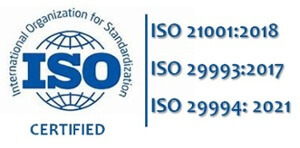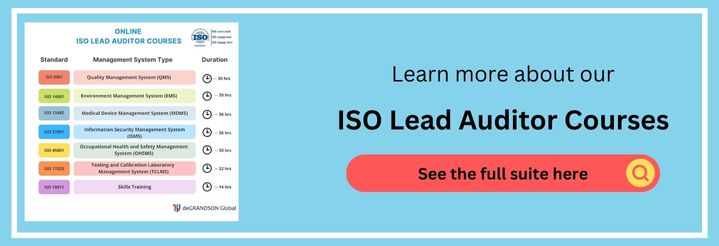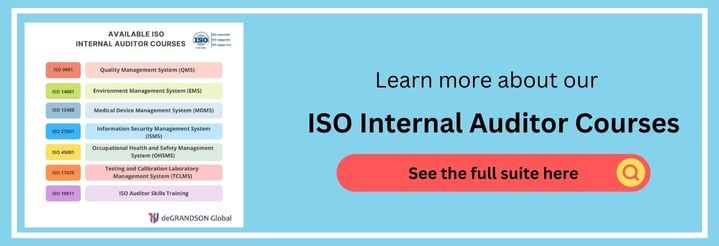
Question: What's the one thing that ISO Auditor Training
can't give you?
Answer: Competency.
Repeatedly, ISO management system standards tell us that true competence has four elements, namely,
Element 1. Auditing Skills,
Element 2: Knowledge of the standard
Element 3: Technical expertise appropriate to the processes being audited, and
Element 4: Practical experience in auditing.
Whether you are an internal auditor, external auditor, audit program manager, or ISO consultant, you will need to work at building competence on a sound foundation of ISO Auditor/Implementer Certification.
The Importance of ISO Auditor Certification Training
Time and again, as a Certification Body auditor, I have found training records for internal auditors and for audit program managers/management representatives that claim competence but satisfy only one of the four criteria, the third one – technical expertise.
It’s as if the others don’t matter and one can learn as much as is required by mimicking colleagues who are ‘experienced’ auditors.
No one ever seems to recognize that this approach will perpetuate bad habits as well as good ones. And I have never seen an internal audit of an Internal Auditing Procedure that included interviews with the internal auditors to check their competency.
I say: Get your auditors trained! But then again, I would – I have a vested interest. But don’t let that blind you to the real benefits that should accrue to your organization. These include …
- With good auditing skills, your auditors will record a variety of evidence types, not just checks that records exist, and have a credible body of evidence to confirm that the management system is adequately implemented and maintained.
Benefit: External auditors, including those from customers and potential customers, will have far fewer nonconformities to find during their audits.
- With an adequate understanding of the Standard in question, your auditors will be able to …
- confirm compliance not only with the documentation of your management system manual but also,
- To check that all the requirements of the Standard are adequately addressed and
- To seek out applicable regulations, standards, and contractual requirements.
Benefit: Customer satisfaction and regulatory compliance is not left to chance. You’ll have objective evidence of the fulfilment of requirements here.
- Be aware of the opportunity to identify improvements that internal audits provide. Too often audits are a useless box-ticking exercise done to satisfy external auditors and not to benefit the organization. What better time is there to discuss improvements than when interviewing the very persons who are doing the work.
Benefit: Step-change improvements are rare. But, with the myriad of small improvements that internal audits can provide, significant reductions of waste, and improvements in efficiency can be achieved.
Historically, finding training courses for internal auditors has been problematic especially if standards other than ISO 9001 and ISO 14001 are involved. No more. With our online Auditor Training Courses, you can plan training to suit your own schedule. And the cost savings versus traditional training methods are significant too.
So, perhaps it’s time to reconsider training for your internal auditors?
Technical Skills and On-the-Job Experience
An appropriate combination of technical skills (such as a relevant university degree, apprenticeship or other third level qualification) and of experience within the sector being audited is essential if an auditor doing internal audits, supplier audits or managing an audit programme if that auditor is to understand the context, processes, methods and the culture of the organization concerned. Three years of experience would be an absolute minimum here.
Element 4: And then there's Competency
Since the 2010 version of ISO 19011, an ISO Auditor Certificate cannot be considered to bestow competence on the holder. Competence being defined in terms of one's ability to apply knowledge and skills has meant that since 2010 Certification Bodies have been required to keep records of the auditing practice and participation of their Lead Auditors that is the basis of the claim of their competency.
The result: Competent ISO Auditors
So, it's not about having a card in your wallet that says you've been registered on a meaningless ISO Auditor Register; it's not about having a Certificate on the wall behind your desk. It's about having put the skills and knowledge gained during your ISO Auditor training into practice by undertaking an ongoing series of audits. And a minimum of three audits per year has traditionally been taken as the minimum number of audits needed to maintain your Competence. Best of luck with your ISO Auditing.
Click on the image thumbnail to see the image in full size,or click the button on the other side to go to our ISO auditor overview page to learn more about our courses.
Related Articles
- What is ISO Auditor Competence,and Who Decides on it?
- 5 Reasons Why Checking the Competency of ISO Auditors is Needed
- ISO Internal Auditor Training - 5 Reasons Why it's a 'Must'
- [Video] When ISO Auditor Training is hard to find
deGRANDSON Global is an ISO Certified Educational Organization
In October 2021, we secured certification to three education-related ISO Standards. We now have a university-grade management system in place conforming to the requirements of …
October 2021, we secured certification to three education-related ISO Standards. We now have a university-grade management system in place conforming to the requirements of …
We have chosen ISO 21001 certification because, unlike IRCA and Exemplar badges (which, in our opinion, are commercially compromised), it is based on independent third-party assessment. It is a ‘university grade’ standard globally by schools, colleges, and universities to demonstrate their competence.


